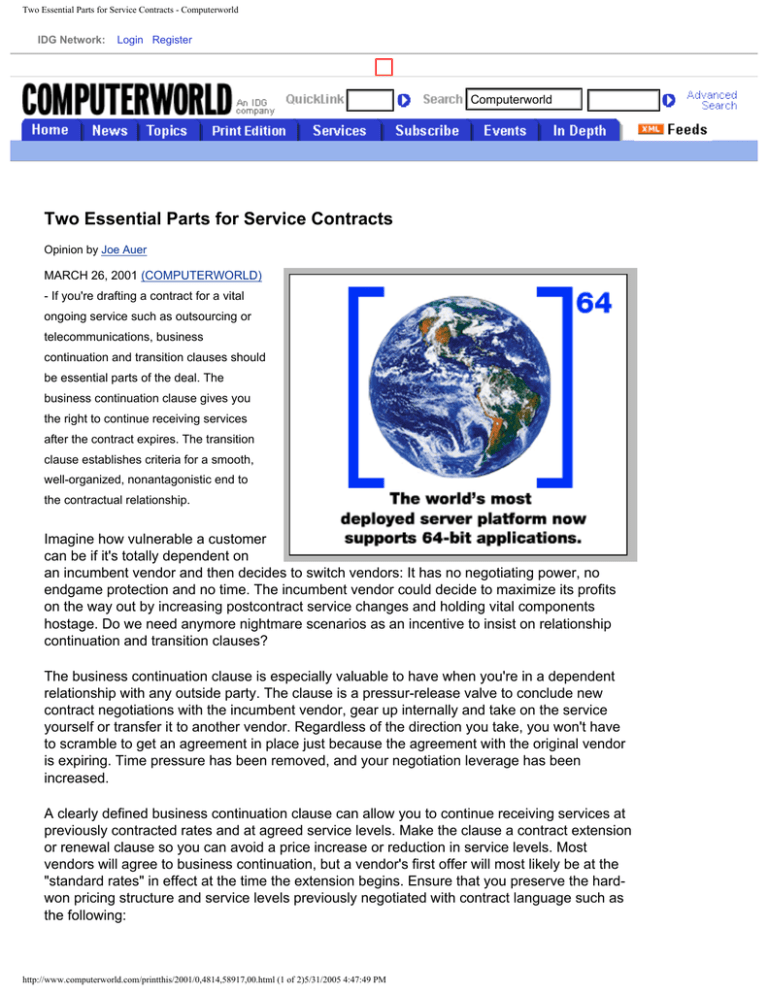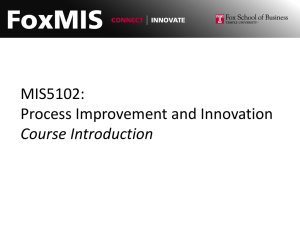
Two Essential Parts for Service Contracts - Computerworld
IDG Network:
Login Register
Computerworld
Two Essential Parts for Service Contracts
Opinion by Joe Auer
MARCH 26, 2001 (COMPUTERWORLD)
- If you're drafting a contract for a vital
ongoing service such as outsourcing or
telecommunications, business
continuation and transition clauses should
be essential parts of the deal. The
business continuation clause gives you
the right to continue receiving services
after the contract expires. The transition
clause establishes criteria for a smooth,
well-organized, nonantagonistic end to
the contractual relationship.
Imagine how vulnerable a customer
can be if it's totally dependent on
an incumbent vendor and then decides to switch vendors: It has no negotiating power, no
endgame protection and no time. The incumbent vendor could decide to maximize its profits
on the way out by increasing postcontract service changes and holding vital components
hostage. Do we need anymore nightmare scenarios as an incentive to insist on relationship
continuation and transition clauses?
The business continuation clause is especially valuable to have when you're in a dependent
relationship with any outside party. The clause is a pressur-release valve to conclude new
contract negotiations with the incumbent vendor, gear up internally and take on the service
yourself or transfer it to another vendor. Regardless of the direction you take, you won't have
to scramble to get an agreement in place just because the agreement with the original vendor
is expiring. Time pressure has been removed, and your negotiation leverage has been
increased.
A clearly defined business continuation clause can allow you to continue receiving services at
previously contracted rates and at agreed service levels. Make the clause a contract extension
or renewal clause so you can avoid a price increase or reduction in service levels. Most
vendors will agree to business continuation, but a vendor's first offer will most likely be at the
"standard rates" in effect at the time the extension begins. Ensure that you preserve the hardwon pricing structure and service levels previously negotiated with contract language such as
the following:
http://www.computerworld.com/printthis/2001/0,4814,58917,00.html (1 of 2)5/31/2005 4:47:49 PM
Two Essential Parts for Service Contracts - Computerworld
Contract continuation: Upon expiration of this agreement, provided the supplier makes such
service generally available to other commercial customers, the customer may elect to extend
the terms and conditions of this agreement for not more than two additional consecutive sixmonth terms without liability for conversion fees. The customer agrees to pay supplier rates,
charges and fees as prescribed in the pricing section of this agreement and to give the
supplier 30 days' notice of such election to continue services.
As is always the case in negotiating a good contract, clear and specific language is the key. It
should leave no doubt that you have the unilateral right to continue the contract for a specified
period. Some suppliers may attempt to base business continuation on mutual agreement
rather than make it an absolute customer right. Don't do it! If it's not your unilateral right,
business continuation can be in jeopardy at a time when it's needed most - and you could be
subjected to highway robbery, courtesy of your vendor.
The second essential is the transition clause. Although the transition and business
continuation clauses can work together, they should be viewed as separate entities, each with
its own purpose. A transition provision gives you the right to an orderly transition of service,
while the business continuation clause gives you breathing room and some negotiating power.
Transition cooperation: The supplier agrees that upon termination of this agreement for any
reason, it shall provide sufficient efforts and cooperation to ensure an orderly and efficient
transition of services to the customer or another supplier. The supplier shall provide full
disclosure to the customer of the equipment, software and third-party supplier about the
services required to perform services for the customer. The supplier shall transfer licenses or
assign agreements for any software or third-party services used to provide the services to the
customer or to another supplier.
A complete transition clause would normally continue beyond that one paragrah, covering
many more details, but the sample provisions capture its essence. Detailing both parties' rights
and obligations beyond this paragraph is well worth the effort.
The continuation and transition clauses should reduce the likelihood of the nightmare of losing
needed services. So, sweet dreams!
Joe Auer is president of International Computer Negotiations Inc. (www.dobetterdeals.com), a
Winter Park, Fla., consultancy that educates users on high-tech procurement. ICN sponsors
CAUCUS: The Association of High-Tech Acquisition Professionals. Contact him at
joea@dobetterdeals.com.
Copyright © 2005 Computerworld Inc. All rights reserved. Reproduction in whole or in part in any form or medium without express written permission of
Computerworld Inc. is prohibited. Computerworld and Computerworld.com and the respective logos are trademarks of International Data Group Inc.
http://www.computerworld.com/printthis/2001/0,4814,58917,00.html (2 of 2)5/31/2005 4:47:49 PM



